牛津译林版高中英语模块8:Unit1 Reading
牛津高中英语模块八_unit1_reading.ppt

How does the author try to convince the reader to read a book?
change our minds
give interesting facts but not enough to give away the story
want to read the book
(3)
they are out of date because of
__a_tt_it_u_d_e_s their strange and difficult
towards classics
language (4)_c_ha_r_a_c_te_r_is_t_ic_s_ .Besides, they are not (5)_re_l_a_te_d___ to life
Consolidation
Read the text again and try to fill in the blanks of the following form.
(1)
Classics are
_D_e_f_in_it_io_n_ the(2)_a_n_ti_q_ue_sof the of classic literary world. They are literature novels, plays and poems
B. introduce Charles Dickens’ novels to us C. suggest that we should read more
classics D. make a summary of Great Expectations
2. Some people think that classics are oldfashioned because of the following statements
牛津高中英语模块8Unit1Grammarproject语言点讲解
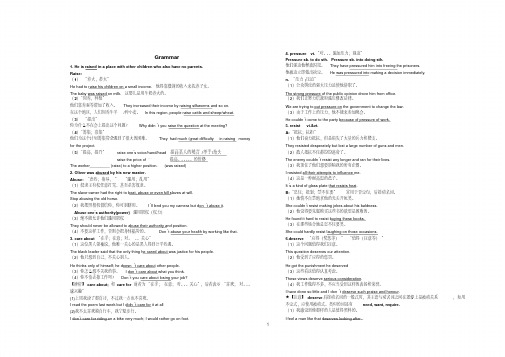
Grammar1. He is raised in a place with other children who also have no parents.Raise:(1)“养大,带大”He had to raise his children on a small income. 他得靠微簿的收入来抚养子女。
The baby was raised on milk. 这婴儿是用牛奶养大的。
(2)“饲养,种植”他们靠养蚕等增加了收入。
They increased their income by raising silkworms and so on.在这个地区,人们饲养牛羊/种小麦。
In this region, people raise cattle and sheep/wheat.(3)“提出”你为什么不在会上提出这个问题?Why didn’t you raise the question at the meeting?(4)“筹集;募集”他们为这个计划筹集资金遇到了很大的困难。
They had much /great difficulty in raising money for the project.(5)“提高,提升”raise one’s voice/hand/head 提高某人的嗓音/举手/抬头raise the price of …提高。
的价格The worker_________ (raise) to a higher position. (was raised)2. Oliver was abused by his new master.Abuse: “虐待;凌辱,”“滥用;乱用”(1)奴隶主有权任意打骂、甚至杀害奴隶。
The slave-owner had the right to beat, abuse or even kill slaves at will.Stop abusing the old horse.(2)我把照相机借给你,你可别瞎用。
高中英语译林牛津新版 模块一unit 1 Extended reading
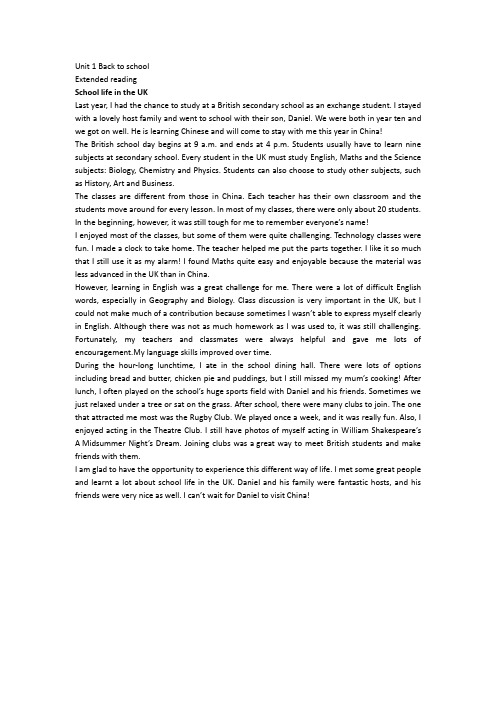
Unit 1 Back to schoolExtended readingSchool life in the UKLast year, I had the chance to study at a British secondary school as an exchange student. I stayed with a lovely host family and went to school with their son, Daniel. We were both in year ten and we got on well. He is learning Chinese and will come to stay with me this year in China!The British school day begins at 9 a.m. and ends at 4 p.m. Students usually have to learn nine subjects at secondary school. Every student in the UK must study English, Maths and the Science subjects: Biology, Chemistry and Physics. Students can also choose to study other subjects, such as History, Art and Business.The classes are different from those in China. Each teacher has their own classroom and the students move around for every lesson. In most of my classes, there were only about 20 students. In the beginning, however, it was still tough for me to remember everyone’s name!I enjoyed most of the classes, but some of them were quite challenging. Technology classes were fun. I made a clock to take home. The teacher helped me put the parts together. I like it so much that I still use it as my alarm! I found Maths quite easy and enjoyable because the material was less advanced in the UK than in China.However, learning in English was a great challenge for me. There were a lot of difficult English words, especially in Geography and Biology. Class discussion is very important in the UK, but I could not make much of a contribution because sometimes I wasn’t able to exp ress myself clearly in English. Although there was not as much homework as I was used to, it was still challenging. Fortunately, my teachers and classmates were always helpful and gave me lots of encouragement.My language skills improved over time.During the hour-long lunchtime, I ate in the school dining hall. There were lots of options including bread and butter, chicken pie and puddings, but I still missed my mum’s cooking! After lunch, I often played on the school’s huge sports field with Daniel and his friends. Sometimes we just relaxed under a tree or sat on the grass. After school, there were many clubs to join. The one that attracted me most was the Rugby Club. We played once a week, and it was really fun. Also, I enjoyed acting in the Theatre Club. I still have photos of myself acting in William Shakespeare’s A Midsummer Night’s Dream. Joining clubs was a great way to meet British students and make friends with them.I am glad to have the opportunity to experience this different way of life. I met some great people and learnt a lot about school life in the UK. Daniel and his family were fantastic hosts, and his friends were very nice as well. I can’t wait for Daniel to visit China!。
牛津译林版8A Unit 1 Reading 课件 (共16张PPT)
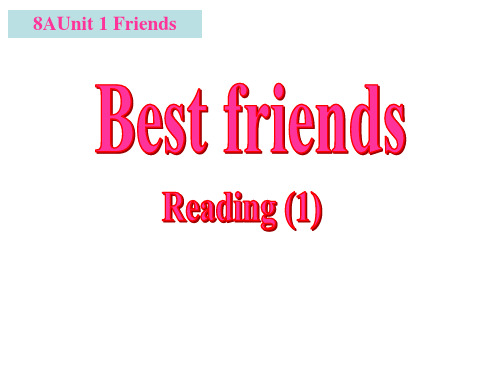
About Max
Listen and answer
1. What does Max look like? He is tall and wears small rouห้องสมุดไป่ตู้d glasses.
funny、 helpful、friendly generous
humorous、 honest (never tell lies)…
give her seat to …
help him with his homework help sb. with sth.= help sb. do sth.
They are helpful.
He is humorous (adj.).
=funny / interesting
About Betty
slim / short hair
generous is willing to share… helpful is ready to help…
helps me with… gives … to someone in need a singer has a good voice
share her ice cream with her friend
donate his pocket money to …
They are generous.
make you laugh
never feel bored with him
tired and uninterested
He has a good sense of humour (n.).
(全)译林牛津版高中英语模块8_Unit 1~4单词
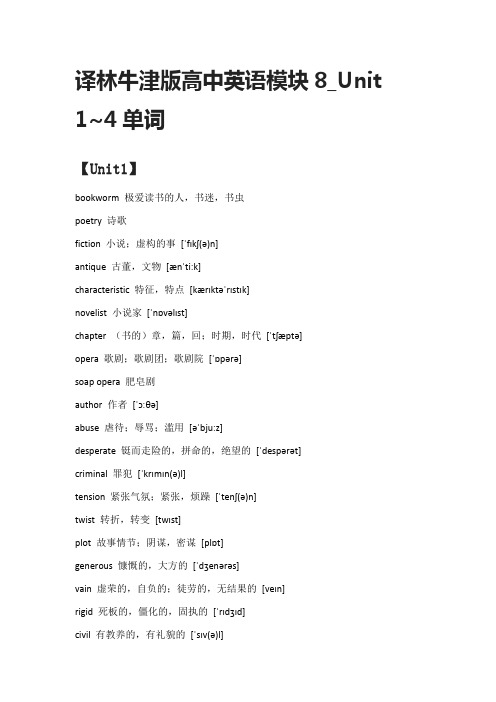
译林牛津版高中英语模块8_Unit 1~4单词【Unit1】bookworm 极爱读书的人,书迷,书虫poetry 诗歌fiction 小说;虚构的事[ˈfɪkʃ(ə)n]antique 古董,文物[ænˈtiːk]characteristic 特征,特点[kærɪktəˈrɪstɪk]novelist 小说家[ˈnɒvəlɪst]chapter (书的)章,篇,回;时期,时代[ˈtʃæptə]opera 歌剧;歌剧团;歌剧院[ˈɒpərə]soap opera 肥皂剧author 作者[ˈɔːθə]abuse 虐待;辱骂;滥用[əˈbjuːz]desperate 铤而走险的,拼命的,绝望的[ˈdespərət]criminal 罪犯[ˈkrɪmɪn(ə)l]tension 紧张气氛;紧张,烦躁[ˈtenʃ(ə)n]twist 转折,转变[twɪst]plot 故事情节;阴谋,密谋[plɒt]generous 慷慨的,大方的[ˈdʒenərəs]vain 虚荣的,自负的;徒劳的,无结果的[veɪn]rigid 死板的,僵化的,固执的[ˈrɪdʒɪd]civil 有教养的,有礼貌的[ˈsɪv(ə)l]bent 弯曲的;驼背的;不诚实的[bend]bent on(doing) something 决心做某事(通常指坏事)theme 主题,主题思想;主题音乐[θiːm]violent 暴力的,粗暴的[ˈvaɪələnt]on the run 躲避;忙碌,不停地奔波painter 画家['peɪntə]live up to 达到,符合(期望)millionaire 百万富翁[mɪljəˈneə]vice 恶行,恶习,罪恶[vaɪs]reform (使)改过,自新,改造[rɪˈfɔːm]violence 暴力,暴行[ˈvaɪələns]resist 反抗,抵制,抵挡[rɪˈzɪst]reunite (使)重逢,再相聚home-made 自制的;家里做的;国产的['həʊm'meɪd]spin (使)快速旋转;(使)急转身;纺纱;吐丝结网[spɪn] sneaker 运动鞋[sneɪk]pin 使不能动弹,按住;(用大头针等)固定,别上,钉住[pɪn] worn out 破烂不堪的,废旧的;精疲力尽的envelope 信封[ˈenvələʊp]brand new 全新的,崭新的spit 吐唾沫(表示愤怒或鄙视)[spæt]chest 胸部,胸膛[tʃest]modern-day 现代的;当代的stepmother 继母stepsister 异父(异母)姊妹rag 破布,破衣服;抹布[ræɡ]Ireland 爱尔兰[ˈaɪələnd]rescue 救援,营救[ˈreskjuː]come to one’s rescue 救援某人,帮助某人Scotland 苏格兰[ˈskɒtlənd]supreme 最高的,至高无上的[suːˈpriːm]reputation 名誉,名声[repjʊˈteɪʃ(ə)n]debt 债务,欠款[det]holy 神圣的,圣洁的[ˈhəʊli]widow 遗孀,寡妇[ˈwɪdəʊ]monument 纪念碑,纪念馆,纪念塑像;古迹[ˈmɒnjʊmənt] adore 热爱,喜爱,爱慕[əˈdɔː]touch on 谈及,涉及intend 打算,计划,想要[ɪnˈtend]be intended to be/do something 目的是作为某物,目的是做某事paragraph 段落[ˈpærəɡrɑːf]rhyme (使)押韵[raɪm]tune 曲调,曲子[tjuːn]in tune 音调准确;演奏合调spring 突然出现;跳,蹦[sprɪŋ]【Unit2】universal 共同的,普遍的,全体的,全世界的[juːnɪˈvɜːs(ə)l] jazz 爵士乐[dʒæz]string 弦;线,细绳;一串,一系列[strɪŋ]cast 选派角色;投射(光影);向……投以(视线、笑容)[kɑːst] butterfly 蝴蝶[ˈbʌtəflaɪ]awesome 极好的;令人惊叹的,令人敬畏的[ˈɔːsəm]stubborn 固执的,顽固的[ˈstʌbən]condemn 判刑,宣判;指责,谴责[kənˈdem]be condemned to something 被处以某种刑罚dare 敢于,胆敢[deə]ask for somebody’s hand in marriage (向女方)求婚disturbing 令人不安的;引起恐慌的[dɪˈstɜːbɪŋ]fall in love 相爱,坠入爱河at first sight 初次见面;乍一看unwilling 不情愿,不愿意;勉强的,无奈的[ʌnˈwɪlɪŋ]seize 逮捕,捉拿;抓住,捉住;夺取,攻占[siːz]demand 强烈要求;需要[dɪˈmɑːnd]evident 清楚的,显然的[ˈevɪdənt]scold 训斥,责骂[skəʊld]merciful 仁慈的,慈悲的,宽大为怀的[ˈmɜːsɪfʊl]dawn 黎明,拂晓;开端,萌芽[dɔːn]deadline 最后期限,截止日期[ˈdedlaɪn]unite 联合,团结,统一[jʊˈnaɪt]grand 宏大的,壮丽的,堂皇的,隆重的[grænd]broken 破损的,受伤的;中止了的;不连续的['brəʊkən] broken heart 破碎的心,哀恸unemployment 失业[ʌnɪmˈplɒɪmənt]personnel 人事部门;职员,全体人员[pɜːsəˈnel]department 部,司,局,处,系[dɪˈpɑːtmənt]personnel department 人事部门chorus 合唱曲;合唱团[ˈkɔːrəs]throat 咽喉的,喉咙[θrəʊt]motherland 祖国[ˈmʌðəlænd]Austria 奥地利[ˈɒstrɪə]tutor 指导教师,家庭教师[ˈtjuːtə]symphony 交响乐,交响曲[ˈsɪmfəni]bachelor 单身汉,未婚男子;学士[ˈbætʃələ]kindergarten 幼儿园[kɪndəˈɡɑːt(ə)n]folk 民间的,民俗的[fəʊk]folk song 民歌,民谣ballet 芭蕾舞剧;芭蕾舞;芭蕾舞团[ˈbæleɪ]album 音乐专辑;相册,影集[ˈælbəm]collection 作品集;收藏品;一批(人或物品);取走[kəˈlekʃ(ə)n] chart 图表;海图[tʃɑːt]the charts 每周流行唱片排行搒root 起源,起因;根,根茎[ruːt]slavery 奴隶身份;奴隶帛[ˈsleɪvəri]tendency 倾向,偏好;趋势,趋向[ˈtendənsi]format 形式;格式;版式[ˈfɔːmæt]spring up 突然兴起,迅速出现liberty 自由[ˈlɪbəti]rock and roll 摇滚乐gradual 逐渐的,逐步的[ˈgrædʒʊəl]decline 衰落,衰败;减少[dɪˈklaɪn]trend 趋势,动向[trend]band 乐队;一伙人;带子;条纹[bænd]seek 试图,设法;寻找,寻求[siːk]prejudice 偏见,成见[ˈpredʒʊdɪs]discrimination 歧视,区别对待[dɪskrɪmɪˈneɪʃ(ə)n] scream 尖叫,高声喊;呼啸[skriːm]break up 破裂,解散;破碎【Unit3】still life 静物画abstract 抽象的[ˈæbstrækt]Spain 西班牙[speɪn]birthplace 出生地;发源地[ˈbɜːθpleɪs]architecture 建筑;建筑学[ˈɑːkɪtektʃə]output 产量,输出量;输出[ˈaʊtpʊt]medium (艺术创作的)材料[ˈmiːdɪəm]acute 锐角的;强烈的[ə'kjuːt]acute angle 锐角cube 立方体,立方形[kjuːb]rectangle 长方形,矩形[ˈrektæŋɡ(ə)l]consensus 共识,一致的意见[kənˈsensəs]calculate 计算;推测[ˈkælkjʊleɪt]helicopter 直升机[ˈhelɪkɒptə]tank 坦克;(储存液体或气体的)箱,槽,罐[tæŋk]shadow 阴影,影子;阴暗处[ˈʃædəʊ]pond 池塘[pɒnd]oil painting 油画starry 布满星星的;像星星的,明亮的commit 全心全意投入[kəˈmɪt]being 身心;存在;生物[ˈbiːɪŋ]reward 回报,报酬,奖励[rɪˈwɔːd]agent 代理人,经纪人[ˈeɪdʒənt]franc 法郎[fræŋk]upwards of 在……以上,大于,超过be off to 动身去……gallery 画廊,陈列室[ˈɡæləri]changeable 多变的,易变的[ˈtʃeɪndʒəb(ə)l]ankle 踝,踝关节[ˈæŋk(ə)l]suite (旅馆)套房;一套家具[swiːt]accommodation 住处;住宿,膳宿;和解,调解[əkɒməˈdeɪʃən] dormitory 集体宿舍[ˈdɔːmɪtəri]canal 运河;灌溉渠[kəˈnæl]passer-by 路人,过路的人['pɑːsə-baɪ]souvenir 纪念物,纪念品['suːvənɪə]admission (机构、组织等的)准许加入,进入权;承认[ədˈmɪʃ(ə)n] scenery 风景,景色,风光['siːnəri]scholarship 奖学金[ˈskɒləʃɪp]cloth 布料,织物;(一块)布[klɒθ]slice 薄片,切片[sliːv]apron 围裙[ˈeɪprən]chef 厨师,(尤指)主厨,厨师长[ʃef]seaweed 海藻,海草[ˈsiːwiːd]cut up 切碎onion 洋葱['ʌnjən]pineapple 菠萝[ˈpaɪnæp(ə)l]eggplant 茄子[ˈeɡplɑːnt]seashell 海贝壳[ˈsiːʃel]lay out 布置,设计pillow 枕头[pɪl]disgusting 令人不快的[dɪsˈɡʌstɪŋ]aluminium 铝[æljʊˈmɪnɪəm]spray 喷,喷洒,向……喷洒[spreɪ]paintbrush 画笔tin 罐子,罐头[tɪn]dip 浸,蘸[dɪp]wrinkle (使)起皱纹[ˈrɪŋk(ə)l]cut something out(of something )剪出,剪下have a go (at )试一试【Unit4】representative 代表[reprɪˈzentətɪv]spokesman 发言人criterion (评判的)标准,准则,原则[kraɪˈtɪərɪən] finance 给……提供经费[ˈfaɪnæns]in defence of 为……辩护;防卫restriction 限制,约束[rɪˈstrɪkʃ(ə)n]deliberately 故意的[dɪˈlɪbərətli]boycott 拒绝购买(或使用、参加),抵制[ˈbɒɪkɒt] hatch 策划,(尤指)密谋;孵化,孵出[hætʃ] sponsor 赞助者,赞助商[ˈspɒnsə]modest 不太大的,不太贵的[ˈmɒdɪst]expose 使接触,使体验[ɪk'spəʊz]contradict 反驳,驳斥[kɒntrəˈdɪkt]resemble 看起来像,类似[rɪˈzemb(ə)l]edge (徽弱的)优势;边缘;刀刃[edʒ]broad 各种各样的,广泛的;宽阔的[brɔːd] overlook 忽略,未注意到[əʊvəˈlʊk]entry 参赛作品;进入,加入;条目,词条[ˈentri] preference 偏爱,偏好[ˈprefərəns]top-ranking 最高等级的,最重要的swift 迅速的,迅捷的[swɪft]laundry 洗衣服;洗衣店[ˈlɔːndri]maid 女仆,侍女;女服务员[meɪd] disappointment 失望,沮丧[dɪsəˈpɒɪntmənt] tiresome 讨厌的,令人厌烦的shoot 拍摄;射击[ʃɒt]sincere 真诚的,诚挚的[sɪnˈsɪə]congratulation 祝贺,恭喜[kənˌgrætjʊ'leɪʃən] screenwriter (电影)编剧,剧作家full-length 足本的;全身的robbery 抢劫[ˈrɒbəri]anecdote 逸事,趣闻[ˈænɪkdəʊt]biography 传记,传记作品[baɪˈɒɡrəfi]accumulate 积累,积聚[əˈkjuːmjʊleɪt]popcorn 爆米花[ˈpɒpkɔːn]salty 咸的,含盐的[ˈsɔːlti]tense 令人紧张的;神经紧张的[tens]thriller 惊险电影(或小说)[ˈθrɪlə]lantern 灯笼,提灯[ˈlæntən]philosopher 哲学家fantasy 幻想,想象[ˈfæntəsi]scar 伤疤,伤痕[skɑː]forehead 额,前额[ˈfɒrɪd]institution 机构;制度[ɪnstɪˈtjuːʃ(ə)n]parallel 平行的;相似的['pærəlel]curriculum 全部课程[kəˈrɪkjʊləm]contradictory 相互矛盾的,对立的,不一致的[ˌkɒntrəˈdɪktəriː ] partner 伙伴,搭档[ˈpɑːtnə]fierce 激烈的,猛烈的;凶狠的[ˈfɪəs]zoom 快速移动;急剧增长[zuːm]broom 扫把,扫帚[bruːm]dizzy 头晕目眩的[ˈdɪzi]attraction 吸引人的特征[əˈtrækʃ(ə)n]show off 炫耀,卖弄disappoint 使失望,使扫兴[dɪsəˈpɒɪnt] give thought to 认真考虑,思考。
译林英语模块8同步教学课件:Unit1SectionⅢ

解析:选A。句意:“——对不起,我不 得不挂断电话了。上课时间到了。”“— —好的,等会儿我再回电话。”A项“挂 断(电话);悬挂,挂起”;B项“解散;中 断;(学校)放假;关系破裂”;C项“放弃 ”;D项“延迟,阻碍;搀扶,支撑;举
起,抬起”。根据句意选择A项。
(3)Under good treatment,many
这些树下多么阴凉舒服啊! ④There are a number of different shades of green. 绿色有许多不同的色调。
牛刀小试 (1)What ________pleasant shade! Let‟s take a rest________. A./;in the shade B.a;in the shade C.the;under the shade D./;under the shade
make up 构成,占比例;编造,捏造; 弥补,补偿;和解;化妆 put up 张贴;建造;举起,抬起;提价; 提供 take up 占据(时间或空间);开始从事
牛刀小试 (1)A notice was ________in order to remind the students of the changed lecture time. A.sent up C.set up up B.given up D.put
易混辨析 get,go,turn,come 易混 词
辨析
例句
They got married 10 years ago.他们十年前结的 婚。 Please don‟t get angry. 请别生气。 The eggs went bad. 鸡蛋变坏了。
强调事件的 施动者发挥 get 的作用或变 化的结果。
Unit1Reading1教案- 高中英语牛津译林版(2020)选择性必修第二册
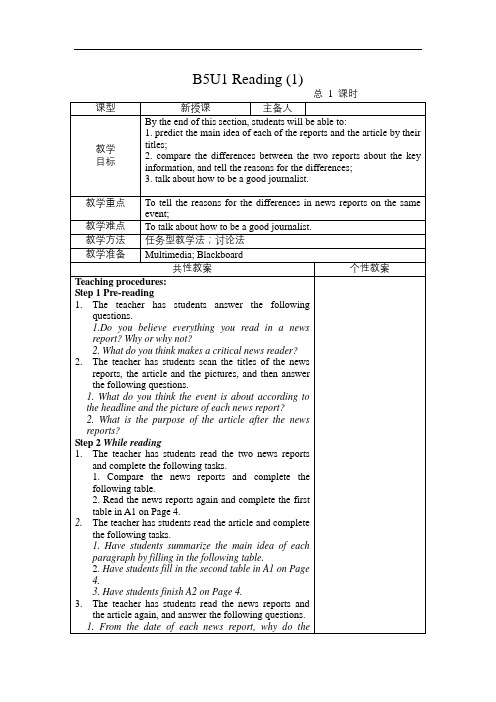
1.The teacher hasstudents read the two news reports and complete the following tasks.
pare the news reports andcompletethe following table.
Step4Summary
Summarize what we’ve learned in this period.
作业布置
Write about how to beagood journaliave students summarize the main idea of each paragraph by filling in the following table.
2.Have students fill inthe second table in A1on Page 4.
3.Have students finish A2 onPage 4.
2. What do you think makes a critical news reader?
2.The teacherhasstudentsscanthetitles of the newsreports,the articleandthe pictures,and then answer the following questions.
2. Read the news reports again and completethe first table in A1 on Page 4.
2.The teacher hasstudents read the article and complete the following tasks.
译林牛津版高中英语选修八Unit1Reading(1)(共15张PPT)

He uses the fortune (7) to move (move) to London and develops the shortcomings of being shallow and having prejudice, and even against his old companions. (8)However , by the end of the novel Pip has learned that wealth does not buy (9) happiness (happy) and that friends are more (10) important (importance) than a fancy education.
• 2. Avoidthe interference of the similar words.
Part II: Careful reading
1. According to the text, which of the following
is Not true?来自BA. All the classics were well written. L2
A. persuade readers to appreciate classic
literature
title & the 1st part
B. introduce Charles Dickens' novels to us
C. let readers know about Dickens
D. make a summary of Great Expectations
B. Oliver Twist was one of his famous novels.
牛津译林版八年级上Unit8 Reading 1(共15张PPT)

Was it thunder? People ran out of the Shopping center
Help! Help!
I was trapped.
Help came.
I screamed for Fra bibliotekelThe wall came down.
Task Three
when the earthquake came (Para. 1-2)
He told himself to calm down. He shouted for help. He started to pull himself slowly through the dark.
He tried to find his way out.
He screamed when he heard some noise above him.
3.You can stay in the corner. Remember : the most important thing is to protect your head.
If you are trapped in the earthquake:
Calm down. Don’t eat your things quickly if you have. Try to find your way out. Shout for help.
No matter what terrible disasters you are facing,
Homework
1.Write a report about Timmy. 2.Try to finish the exercises on P95-96.
Thank you!
牛津高中英语模块八_unit1_readingPPT课件

libraries.
7
3. Which of the following is Not true according to the text? C A. Classics are also worth reading today. B. We can find the value of writing and wisdom in classics. C. Classics have nothing to do with life today. D. Some classics have been adapted for movies.
3. plot 4. theme
5 characters
a. mist b. what it means to
be a gentleman c. England in the early 1800s d. Pip, Joe, Estella e. a stranger gives Pip a lot of money, then Pip moves to London and becomes a snob
6
2. Some people think that classics are oldfashioned because of the following statements
except _____D_____.
A. they were written a long time ago. B. their language characteristics are quite
牛津译林版高中英语模块1课文翻译

牛津高中英语模块1课文翻译M1 U1 Reading School life in the UK 在英国的学校生活Going to a British high school for one year was a very enjoyable and exciting experience for me. 在英国上了一年的中学对我来说是一段非常令人愉快和兴奋的经历。
I was very happy with the school hours in Britain because school starts around 9 a.m. and ends about 3.30 p.m. 我很喜欢英国中学的作息时间,因为学校每天上午大约9点上课,下午大约3点半放学。
This means I could get up an hour later than usual, as schools in China begin before 8 a.m. 这意味着我每天可以比以往晚一个小时起床,因为在中国学校每天上午8点之前就开始上课了。
On the first day, all of the new students attended an assembly in the school hall. 开学第一天,所有的新生都去学校礼堂参加晨会。
I sat next to a girl whose name was Diana. We soon became best friends. 我当时坐在一个名叫黛安娜的女孩身边。
我们很快就成了最好的朋友。
During the assembly, the headmaster told us about the rules of the school. 在晨会上,校长向我们宣布了校规。
He also told us that the best way to earn respect was to devote ourselves to study and achieve high grades. This sounded like my school in China. 他还告诉我们,赢得尊重的最佳途径就是专心学习并取得好成绩。
牛津高中英语模块八_unit1_reading 精品优选公开课件

common features
classic literature !
Do you think it is worth appreciating the classic literature ?reasons?
1.Different language characters
1.Still sold in bookshops
3. plot 4. theme
5 characters
a. mist b. what it means to
be a gentleman c. England in the early 1800s d. Pip, Joe, Estella e. a stranger gives Pip a lot of money, then Pip moves to London and becomes a snob
Today, we’ll focus on the novel Great Expectations written by Charles Dickens, an example of __c_l_a_s_si_c_s___.
1.The main elements of the novel
1. setting 2. symbol
different from those of modern works. C. they are difficult for people to understand. D. They can only be found in bookshops and
libraries.
3. Which of the following is Not true according to the text? C A. Classics are also worth reading today. B. We can find the value of writing and wisdom in classics. C. Classics have nothing to do with life today. D. Some classics have been adapted for movies.
牛津译林版8A unit 1 Reading (共15张PPT)
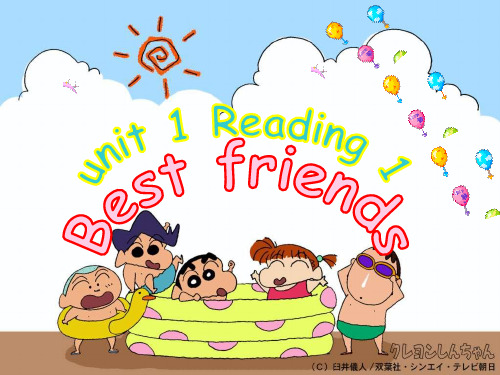
am in trouble.
helpful
She is willing/ready to help me any time.
She is good at telling jokes. She often makes us laugh.
She has a good sense of humour. humourous
1. Write something about your best friend, write about his/her looks, personality, hobbies and his/her future plans.
2. Listen and read the passage .
A:Who would you choose as your best friend, …?
B:---….
A:Why?
B:---…..
A:What does he/she look like?
B:---…..
Try to say something about your best friend.
Homework:
friends. F
Discussion
Who would you choose as your best friend? Why?
Complete Part B3 by yourselves.
牛津高中英语模块八-unit1-readingPPT优秀课件

Today, we’ll focus on the novel Great Expectations written by Charles Dickens, an example of __c_l_a_s_si_c_s___.
9
1.The main elements of the novel
1. setting 2. symbol
6
2. Some people think that classics are oldfashioned because of the following statements
except _____D_____.
A. they were written a long time ago. B. their language characteristics are quite
3.Have nothing to do with our life
2.Many films adapted from them and wellreceived by people
5
Detailed reading
Multiple choice
1. The writer wrote the passage mainly to A__.
2
world.”
3
ቤተ መጻሕፍቲ ባይዱ 4
Do you think it is worth appreciating the classic literature ?reasons?
1.Different language characters
1.Still sold in bookshops
2.Old and boring
10
- 1、下载文档前请自行甄别文档内容的完整性,平台不提供额外的编辑、内容补充、找答案等附加服务。
- 2、"仅部分预览"的文档,不可在线预览部分如存在完整性等问题,可反馈申请退款(可完整预览的文档不适用该条件!)。
- 3、如文档侵犯您的权益,请联系客服反馈,我们会尽快为您处理(人工客服工作时间:9:00-18:30)。
title Appreciating Literature
(1)
*Classics are the (2)_a_n__t_iq_u__e_s_of the
Consolidation: Retelling
Pip, orphan , sister and her husband ,Kent, mean, kind…
7, Misty, tombs, stranger, frighten, captured anyway, symbol, danger, uncertainty ….
Chinese Classics
A Dream of Red Mansions
Chinese Classics
Three Kingdoms
Chinese Classics
Water Margin
Chinese Classics
The Journey to the West
Detailed Reading
(5)
*difficult to read;
_f_e_a_t_u_r_e__
*old-fashioned and boring (to some people);
*(6)_h_a_v_i_n_g__ a place in the world;
*many (7)_s_u_c_c_e_s_s_f_u_l films based on them;
(10)_w_o__r_k_s Great Expectations
Decide if the statements below are true or false.
F 1.Charles Dickens wrote many poems. T 2.He first published many novels one
Consolidation: Retelling
18, fortune, generous, financial problems, London, companion…
chapter at a time in newspapers F 3.His novels were never performed on
stage. T 4.His novels at that time were like the
soap operas we see on TV today. T 5.His tomb reads, “By his death one of
England’s writer is lost to the world.”
Let’s appreciate the novel
Great Expectations!
Do you still remember the main elements of a novel?
characters
a plot
*having (8)_so__m__e_th__in_g_ to do with life today;
(9)_wa_ur_it_th_eo_r_r Charles Dickens(1812-1870), England
famous Oliver Twist, David Copperfield,
Unit1 The written word
Reading Appreciating literature
Lead in What will you do for entertainment in your spare time?
1.Reading is to the mind what exercise to the body. 阅读对于心灵之重要,犹如运动之于身体. 2.Enlarge your views by reading. 读书以长见识. 3.Some books are to be tasted, others to be swallowed, and some few to be chewed and digested. 一些书可供品尝,一些书可吞咽,较少的一些书 需咀嚼消化.
What does Pip learn by the end of the novel?
• He learns that wealth does not buy happiness and that friends are more important than a fancy education.
time a place
setting
a problem theme
a climax or an ending
Match the elements with correct examples
1. characters 2. setting 3. symbol 4. theme 5. plot
mist What it means to be a gentleman England in the early 1800s Pip, Joe, Estella A stranger gives Pip a lot of money, then Pip moves to London and becomes a snob
4.Reading makes a full man, conference a ready man, and writing an exact man. 阅读使人渊博,交谈使人机灵,写作使人严谨. 5.A good book is the br. 好书如挚友,情意永不渝.
d_e_f_i_n_i_ti_o_n_
literature world.
*They are novels, (3)_p__la_y__s_ and poems
(4)_w__r_it_t_e_n_ long ago and still read today.
*using a different language;
